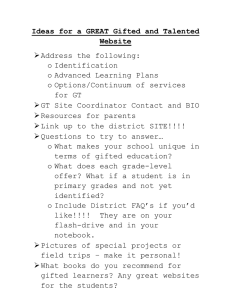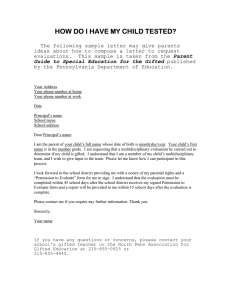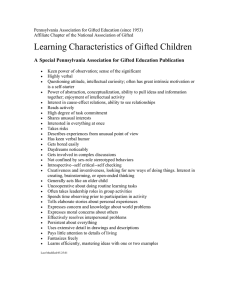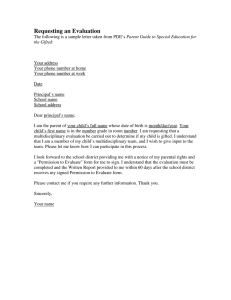How Do I Work with My Child’s School? BE INFORMED…
advertisement
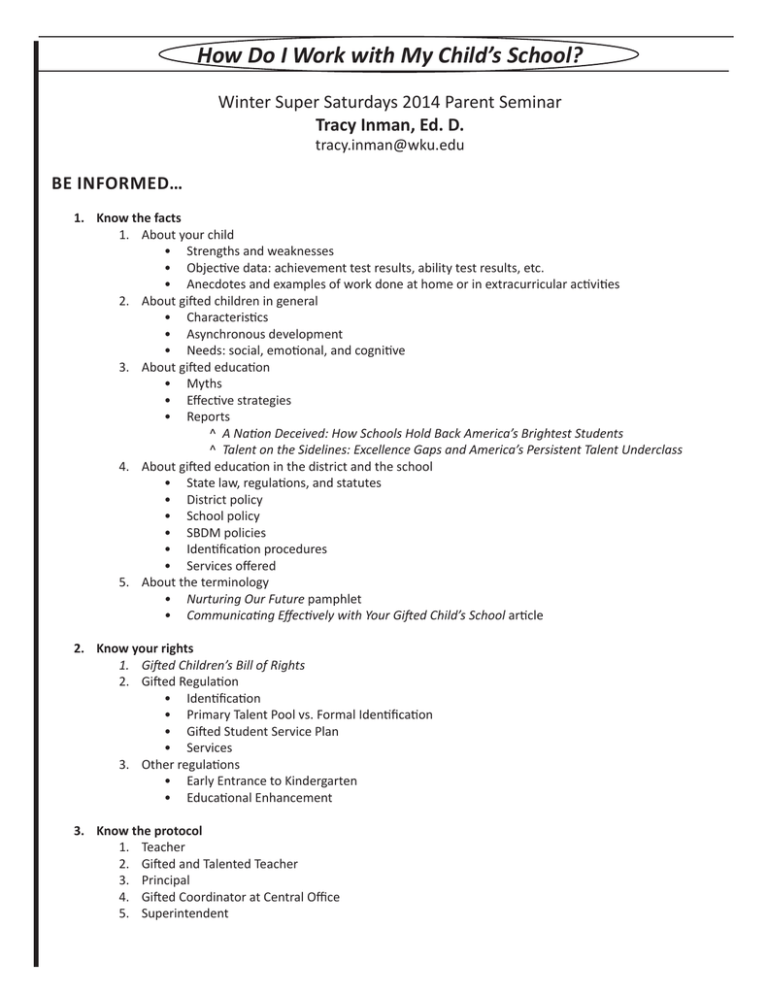
How Do I Work with My Child’s School? Winter Super Saturdays 2014 Parent Seminar Tracy Inman, Ed. D. tracy.inman@wku.edu BE INFORMED… 1. Know the facts 1. About your child • Strengths and weaknesses • Objective data: achievement test results, ability test results, etc. • Anecdotes and examples of work done at home or in extracurricular activities 2. About gifted children in general • Characteristics • Asynchronous development • Needs: social, emotional, and cognitive 3. About gifted education • Myths • Effective strategies • Reports ^ A Nation Deceived: How Schools Hold Back America’s Brightest Students ^ Talent on the Sidelines: Excellence Gaps and America’s Persistent Talent Underclass 4. About gifted education in the district and the school • State law, regulations, and statutes • District policy • School policy • SBDM policies • Identification procedures • Services offered 5. About the terminology • Nurturing Our Future pamphlet • Communicating Effectively with Your Gifted Child’s School article 2. Know your rights 1. Gifted Children’s Bill of Rights 2. Gifted Regulation • Identification • Primary Talent Pool vs. Formal Identification • Gifted Student Service Plan • Services 3. Other regulations • Early Entrance to Kindergarten • Educational Enhancement 3. Know the protocol 1. Teacher 2. Gifted and Talented Teacher 3. Principal 4. Gifted Coordinator at Central Office 5. Superintendent How Do I Work with My Child’s School? continued 4. Know how to communicate effectively 1. The wish list 2. Understanding the educator • Lack of formal training • Differentiation for struggling learners • Belief in the myths • Emphasis on accountability and high-stakes testing 3. Formal versus informal 4. The conference • Suggestions for Effective Conferences (Whitney & Hirsch, 2011) ^ Control your emotions. ^ Thank one another for taking the time to meet. ^ Listen first. ^ Make eye contact. ^ Wait before you respond. ^ Paraphrase. ^ Be courteous. ^ Stress “we,” not “you.” ^ Keep an open mind. ^ Write a note of thanks to the teacher that summarizes the key points of your discussion and the decisions or agreements that were made. ^ Understand that you will probably need more conferences. • Tips for Your Gifted Kids’ Parent-Teacher Conferences (Berger, 2014) ^ Plan ahead. ^ Establish a feeling of teamwork. ^ Listen carefully for positive and negative ways the teacher describes your child. ^ Clarify expectations – yours and the teacher’s. ^ Don’t assume that the teacher has a great deal of experience with educating gifted children. • Tips for Talking to Teachers (Walker, 2012) ^ Make an appointment. Don’t just drop in. ^ Document what your child has done, said, or read. ^ Plan what you’re going to say. ^ Choose your words carefully. Try to start with something positive. ^ Build a partnership and negotiate solutions. Work as a team. ^ Be diplomatic, tactful, and respectful. ^ Focus on what your child needs. ^ Listen. ^ Bring along your sense of humor. ^ Summarize what you have discussed and a time line. Plan a follow-up meeting. 5. Know the questions to ask 1. Questions Parents of Gifted Children Should Ask Schools (Gallagher, 1998) • What services are available for gifted students in this school and school system, and what are the goals of such services? • How much time each week will my child spend in the gifted education program or receive services? • Have the teachers in the gifted education program received specialized training? • Has my child received an assessment? • Are there specialized materials (e.g., software) used in the gifted education program or services? • How will the school know if the gifted education program or services are working? • How can I help the program? How Do I Work with My Child’s School? continued 2. Important Questions to Ask the Teacher (Berger, 2014) • What are your academic goals for the year? • What do you see as my child’s strengths? Can you give me some examples? • What are some areas that my child needs to work on? • How would you evaluate my child’s learning profile? • How can I help? 6. Know how to partner 1. Volunteer 2. Acknowledge varied perspectives 3. Listen 4. Share information and opportunities 5. KAGE http://www.kagegifted.org/ • Be a member • Encourage teachers and school to be members • Give individual or institutional memberships Resources • Berger, S. (2014). Tips for your gifted kids’ parent-teacher conferences. familyeducation. Retrieved from http://school.familyeducation.com/gifted-education/parent-teacher-conferences/38665.html • Colangelo, N., Assouline, S. G., & Gross, M. U. M. (2004). A nation deceived: How schools hold back America’s brightest students (Vol. 1). Iowa City: The University of Iowa, The Connie Belin & Jacqueline N. Blank International Center for Gifted Education and Talent Development. Retrieved from http://www.accelerationinstitute.org/nation_deceived/ • Plucker, P., Hardesty, J., & and Burroughs, N. (2014). Talent on the sidelines: Excellence gaps and America’s persistent talent underclass. Storrs, CT: Center for education Policy Analysis. Retrieved from http://cepa. uconn.edu/uconncepa/assets/File/AG/excellence2013/ Excellence%20Gap%2010%2018%2013_JP_LK.pdf • Rimm, S. (1994). Keys to parenting the gifted child. New York, NY: Barron’s Educational Services, Inc. • Shoplik, A. (2009-10). Tips for parents: Advocacy – working with your child’s school. Davidson Institute for Talent Development. Retrieved from http://www.davidsongifted.org/db/Articles_id_10558.aspx • Walker, S. Y. (2002). The survival guide for parents of gifted kids: How to understand, live with, and stick up for your gifted child. Minneapolis, MN: Free Spirit Publishing. • Whitney, C. S., & Hirsch, G. (2011). Helping gifted children soar: A practical guide for parents and teachers (2nd ed.) Scottsdale, AZ: Great Potential Press.

